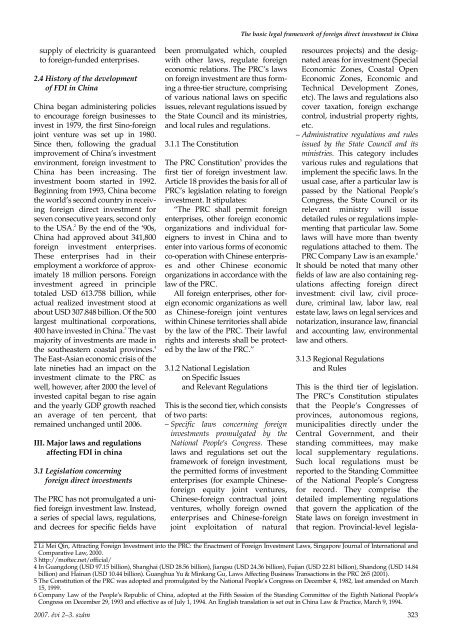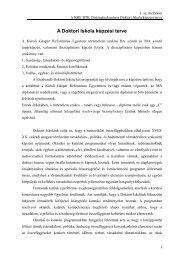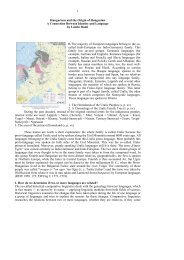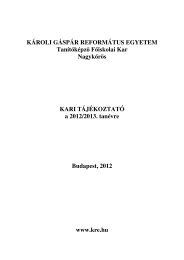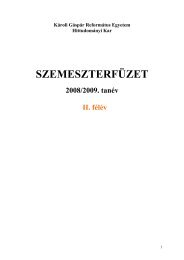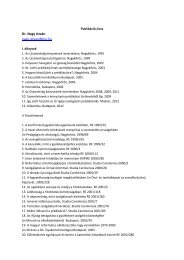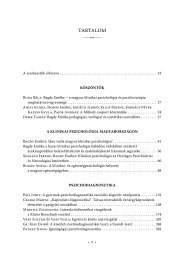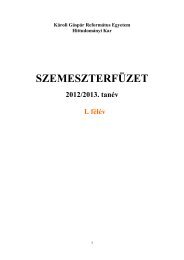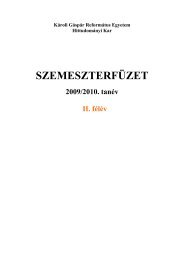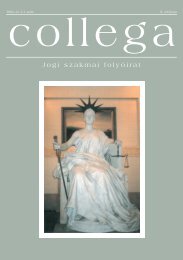collega - Károli Gáspár Református Egyetem
collega - Károli Gáspár Református Egyetem
collega - Károli Gáspár Református Egyetem
You also want an ePaper? Increase the reach of your titles
YUMPU automatically turns print PDFs into web optimized ePapers that Google loves.
The basic legal framework of foreign direct investment in China<br />
supply of electricity is guaranteed<br />
to foreign-funded enterprises.<br />
2.4 History of the development<br />
of FDI in China<br />
China began administering policies<br />
to encourage foreign businesses to<br />
invest in 1979, the first Sino-foreign<br />
joint venture was set up in 1980.<br />
Since then, following the gradual<br />
improvement of China’s investment<br />
environment, foreign investment to<br />
China has been increasing. The<br />
investment boom started in 1992.<br />
Beginning from 1993, China become<br />
the world’s second country in receiving<br />
foreign direct investment for<br />
seven consecutive years, second only<br />
to the USA. 2 By the end of the ‘90s,<br />
China had approved about 341,800<br />
foreign investment enterprises.<br />
These enterprises had in their<br />
employment a workforce of approximately<br />
18 million persons. Foreign<br />
investment agreed in principle<br />
totaled USD 613.758 billion, while<br />
actual realized investment stood at<br />
about USD 307.848 billion. Of the 500<br />
largest multinational corporations,<br />
400 have invested in China. 3 The vast<br />
majority of investments are made in<br />
the southeastern coastal provinces. 4<br />
The East-Asian economic crisis of the<br />
late nineties had an impact on the<br />
investment climate to the PRC as<br />
well, however, after 2000 the level of<br />
invested capital began to rise again<br />
and the yearly GDP growth reached<br />
an average of ten percent, that<br />
remained unchanged until 2006.<br />
III. Major laws and regulations<br />
affecting FDI in china<br />
3.1 Legislation concerning<br />
foreign direct investments<br />
The PRC has not promulgated a unified<br />
foreign investment law. Instead,<br />
a series of special laws, regulations,<br />
and decrees for specific fields have<br />
been promulgated which, coupled<br />
with other laws, regulate foreign<br />
economic relations. The PRC’s laws<br />
on foreign investment are thus forming<br />
a three-tier structure, comprising<br />
of various national laws on specific<br />
issues, relevant regulations issued by<br />
the State Council and its ministries,<br />
and local rules and regulations.<br />
3.1.1 The Constitution<br />
The PRC Constitution 5 provides the<br />
first tier of foreign investment law.<br />
Article 18 provides the basis for all of<br />
PRC’s legislation relating to foreign<br />
investment. It stipulates:<br />
“The PRC shall permit foreign<br />
enterprises, other foreign economic<br />
organizations and individual foreigners<br />
to invest in China and to<br />
enter into various forms of economic<br />
co-operation with Chinese enterprises<br />
and other Chinese economic<br />
organizations in accordance with the<br />
law of the PRC.<br />
All foreign enterprises, other foreign<br />
economic organizations as well<br />
as Chinese-foreign joint ventures<br />
within Chinese territories shall abide<br />
by the law of the PRC. Their lawful<br />
rights and interests shall be protected<br />
by the law of the PRC.”<br />
3.1.2 National Legislation<br />
on Specific Issues<br />
and Relevant Regulations<br />
This is the second tier, which consists<br />
of two parts:<br />
– Specific laws concerning foreign<br />
investments promulgated by the<br />
National People’s Congress. These<br />
laws and regulations set out the<br />
framework of foreign investment,<br />
the permitted forms of investment<br />
enterprises (for example Chineseforeign<br />
equity joint ventures,<br />
Chinese-foreign contractual joint<br />
ventures, wholly foreign owned<br />
enterprises and Chinese-foreign<br />
joint exploitation of natural<br />
resources projects) and the designated<br />
areas for investment (Special<br />
Economic Zones, Coastal Open<br />
Economic Zones, Economic and<br />
Technical Development Zones,<br />
etc). The laws and regulations also<br />
cover taxation, foreign exchange<br />
control, industrial property rights,<br />
etc.<br />
– Administrative regulations and rules<br />
issued by the State Council and its<br />
ministries. This category includes<br />
various rules and regulations that<br />
implement the specific laws. In the<br />
usual case, after a particular law is<br />
passed by the National People’s<br />
Congress, the State Council or its<br />
relevant ministry will issue<br />
detailed rules or regulations implementing<br />
that particular law. Some<br />
laws will have more than twenty<br />
regulations attached to them. The<br />
PRC Company Law is an example. 6<br />
It should be noted that many other<br />
fields of law are also containing regulations<br />
affecting foreign direct<br />
investment: civil law, civil procedure,<br />
criminal law, labor law, real<br />
estate law, laws on legal services and<br />
notarization, insurance law, financial<br />
and accounting law, environmental<br />
law and others.<br />
3.1.3 Regional Regulations<br />
and Rules<br />
This is the third tier of legislation.<br />
The PRC’s Constitution stipulates<br />
that the People’s Congresses of<br />
provinces, autonomous regions,<br />
municipalities directly under the<br />
Central Government, and their<br />
standing committees, may make<br />
local supplementary regulations.<br />
Such local regulations must be<br />
reported to the Standing Committee<br />
of the National People’s Congress<br />
for record. They comprise the<br />
detailed implementing regulations<br />
that govern the application of the<br />
State laws on foreign investment in<br />
that region. Provincial-level legisla-<br />
2 Li Mei Qin, Attracting Foreign Investment into the PRC: the Enactment of Foreign Investment Laws, Singapore Journal of International and<br />
Comparative Law, 2000.<br />
3 http://moftec.net/official/<br />
4 In Guangdong (USD 97.15 billion), Shanghai (USD 28.56 billion), Jiangsu (USD 24.36 billion), Fujian (USD 22.81 billion), Shandong (USD 14.84<br />
billion) and Hainan (USD 10.44 billion). Guanghua Yu & Minkang Gu, Laws Affecting Business Transactions in the PRC 265 (2001).<br />
5 The Constitution of the PRC was adopted and promulgated by the National People’s Congress on December 4, 1982, last amended on March<br />
15, 1999.<br />
6 Company Law of the People’s Republic of China, adopted at the Fifth Session of the Standing Committee of the Eighth National People’s<br />
Congress on December 29, 1993 and effective as of July 1, 1994. An English translation is set out in China Law & Practice, March 9, 1994.<br />
2007. évi 2–3. szám<br />
323


